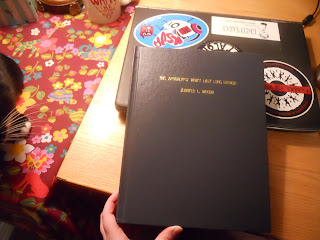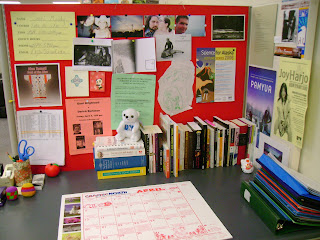Back in May, a few weeks after I defended my graduate thesis, I wrote
a blog post about my deciding whether to try to find a job teaching or as an administrative assistant.
High on the success of finishing the last requirement for my degree, I felt sure that now I would have a chance at finding a job that challenged me intellectually and supported me financially. I might even be one of those people who could tell others "I love my job." I daydreamed about proudly updating my LinkedIn profile with "teaches at such and such community college" or "executive assistant at awesome non-profit."
Three months later, I realize how naive I was.
Here are a few things I've learned so far.
Your MFA Does Not Qualify You to Be An Administrative Assistant
It seems I'm not alone in my misconception that a Masters in an English field should make me an ideal candidate for an administrative assistant position. NPR recently published
an article about a graduate with a Masters in English. He works as an adjunct, but is also searching for a full-time job as an office assistant. Frustrated with his job search, he decided to create his own Craigslist ad for a pretend job to see what his competition was like.
What he discovered was that most of the applicants had much more experience as an administrative assistant than he did - even as much as ten years.
I took for granted that my graduate degree in writing would show employers that I can proofread like nobody's business, that my official correspondence would win over grants and clients, that I'd be able to analyze customer service situations and form concise, specific responses that would clear all paths of conflict.
But being an administrative assistant is not just about writing. There's infinitely more to the job than that, and employers know it. They want someone who has experience with office-specific software (and I'm not talking about Microsoft Office), can handle a multi-line phone, and who knows how to work within the flow of an office setting.
I worked for a year as an office assistant before heading to graduate school, but that one year of experience is nothing. The only job I might be able to find as an administrative assistant would be an entry-level position, a $25,000 salary if I'm lucky. The competition for these is steep. And once the employer notices I've got a master's degree and have taught at the college level I'm done for. Why hire someone who will probably just leave in a year or two to go back into teaching or on for more school when there are hundreds of applicants who would stay put?
I interviewed for a receptionist position last week that paid $9 an hour. They told me I was hideously over-qualified and never called me back.
If You Want to Adjunct, Your Transcript Had Better Be Conferred
It is mid-August, and I've given up hope of being able to adjunct this semester. Classes in Alabama start on August 20th, and my degree will not be conferred until August 22nd.
The date of graduation all depends on when you defend your thesis. In order to have a spring graduation, you have to defend your thesis in March. I needed a few extra months to work on my thesis, and defended it in May. Due to a technicality, you have to be enrolled in 3 credit hours in the semester in which you defend. So, I had to register for 3 thesis hours during the summer semester. I only recently realized that the summer semester does not end until mid-August, and that the graduate school would not confer my degree until after the summer semester had ended.
I've applied to 23 teaching positions this summer, and I've only been interviewed for two of them. Most of the colleges sent me rejection letters right away, stating that I did not meet the minimum qualifications because I was "still taking classes."
I've sent colleges my degree audit, an explanation of the technicalities that are keeping my degree from being conferred, but the colleges are immovable on this point. Your graduate transcript must say "degree conferred" before they will consider you for an adjunct or full-time position.
Of the two teaching jobs I have interviewed for, I only felt that I actually had a chance at getting one of them. This interview - the "you were in our top 3" interview - I lost out on partially because I hadn't taught creative writing classes as the primary instructor.
The other interview took place at a rural community college, where I watched five other people interviewed during the two hours I was there, and they had an additional full day of interviews lined up. One man who had just been interviewed approached me in the parking lot and said "I'd wish you good luck, but I want this job." I'm not sure why this particular community college did not mind that my degree was not conferred - maybe they didn't notice until after the interviews, maybe they had to make a quota of so many applicants interviewed - but in the end I received the same result as all of my other job rejections: a form letter in the mail.
Some of the rejection letters have the name of the person hired for the job, and when I Google these people they have 30+ years of teaching experience, PhDs, book publications - all this for a job at a community college whose starting pay is $30,000. How can I even begin to compete?
This Degree is for Me
I loved getting my MFA. Nothing could have helped me grow so much as a writer other than going to graduate school for three years and focusing on reading, writing, teaching. I would do it again in a heartbeat.
But I'm seriously considering leaving my MFA off of my resume and applying to minimum-wage jobs. They won't build my career, I won't proudly announce them to friends and family, but I must find a way to make money very very soon.
When I set off for Alaska and my graduate degree, I thought I was leaving behind my days in an office. I thought there was a better life on the other side of the MFA. But mostly, there's just been the feeling of discontent. Of knowing I have so much enthusiasm for teaching and writing that is useless out in the real world.
Resources & Strategies
I may have dug my own grave with a summer graduation, but if you're a recent MFA graduate or an MFA hopeful, I wish you more luck. Here are some resources and strategies that have been passed on to me from other writers and MFA grads.
Connect with your local community colleges
- Find your state Community College System website (Alabama's is here). This website will post new job openings, and some states have a very helpful online submission system.
- Email local community colleges with your information, or follow their guidelines for submitting an adjunct package. Then wait. Schools may not hire until a few weeks before the term begins. (Thanks to Ashley Cowger for this advice!)
Check national databases for university positions
University jobs are a little harder to keep track of than community college ones. I've found the job boards at universities to be updated less frequently and for English jobs to be buried by unhelpful search criteria. These national databases have the option of searching for local positions, and are updated regularly.
- AWP's job board - The best job board. If schools post a job anywhere, they usually post it here. Use it as much as you can while you still have your membership from being an MFA student
- Poets & Writers - not as many useful job hits, but still worth checking out.
- Higher Ed Jobs - an excellent search system. The advanced search lets you weed out online-only colleges and you can specify the geographical and subject area.
- Academic Jobs Wiki - Wonderful interactive wiki about creative writing faculty positions. People who apply update the wiki letting you know when the position has been filled, whether the school is doing interviews, etc. There's a separate page for literature faculty positions, and the wiki has a new page for positions each year, so it is easy to keep track of which positions are open.
Look at jobs that aren't exactly teaching positions
While searching for English instructor and adjunct positions, I've come across a few job openings that aren't exactly teaching, but that seem to view teaching as a worthy credential. These usually have to do with working with high school or college students to plan their careers. The benefits of this type of job are clear: steady work hours with no take home work, steady pay throughout the summer, and a guaranteed level of income that is consistent from semester to semester. If you want to apply to these jobs, I recommend brushing up on your PowerPoint and presentation skills. So far, these types of positions are my most optimistic chance of employment. They aren't exactly teaching, but they might be a really good middle ground.
Consider teaching abroad
Teaching positions in countries
like Japan or South Korea usually pay really well and can offer an opportunity to nourish your creative soul by visiting a new place. The application process can be lengthy and you may have to travel to a major US city for an in-person interview. But if you feel like you absolutely must teach and cannot find a position in the US, then there are many opportunities in other countries to teach ESL.



























